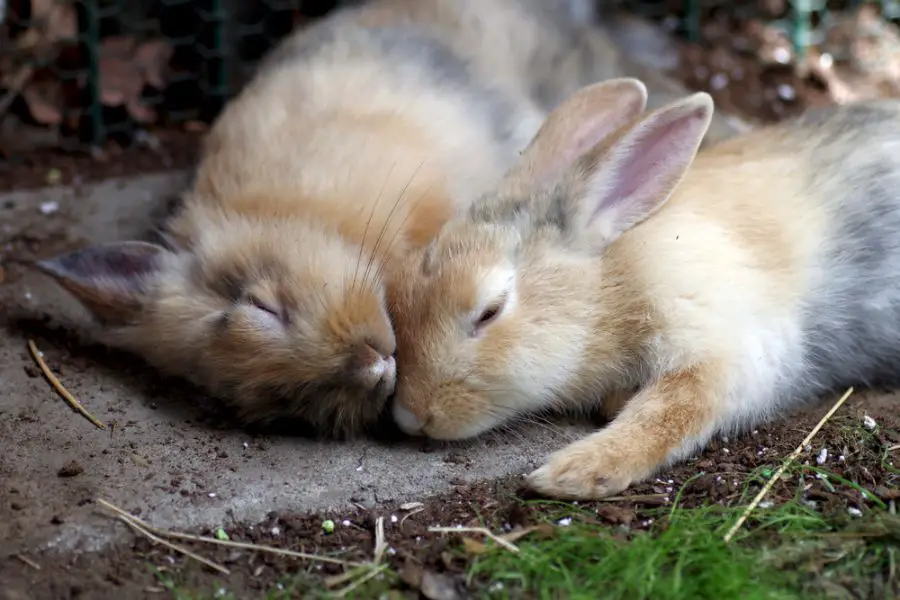Introduction
Why Do Rabbits Thump: The rhythmic and sudden sound of a rabbit’s thump is a behavior that has captivated the curiosity of both animal enthusiasts and researchers alike. Rabbits, those small, furry creatures that inhabit a diverse range of environments, are known for their sensitivity to their surroundings and their adeptness at communicating through various means. One such behavior that has intrigued observers for centuries is the rabbit’s distinctive thumping behavior. This action involves the rabbit forcefully striking its hind legs against the ground, producing a distinct sound that echoes through their habitat.
While seemingly simple, this behavior carries a wealth of significance in the rabbit’s world, serving as a vital form of communication that helps them navigate and survive in the wild. In this exploration, we delve into the reasons behind why rabbits thump and uncover the intricate ways in which this behavior is intertwined with their survival strategies and social interactions.
One of the primary reasons rabbits thump is to alert other members of their warren (a group of rabbits) to potential dangers. Rabbits eat are prey animals and are constantly on the lookout for predators. When they sense a threat approaching, such as a predator or a human presence, they use their powerful hind legs to thump the ground. The vibrations produced by the thumping serve as a clear warning signal to other rabbits, allowing them to be on high alert and take evasive action if needed.
Rabbits are known to be territorial creatures, especially when it comes to their burrows and the immediate vicinity around them. Thumping can also be a way for rabbits to assert their dominance over their territory. By creating loud noises that travel through the ground, a thumping rabbit sends a clear message to potential intruders that the area is already claimed. This territorial behavior can help prevent conflicts and reduce the risk of encounters with unfamiliar rabbits.

Are rabbits happy when they thump?
Despite what you may have seen on cartoons as a kid, rabbits do not thump as a form of affection or as a mating behavior. Rabbits will thump when they are scared of something they’ve seen, smelled, or heard. Thumping is how rabbits in the wild warn their family group of danger.
The Nature of Thumping
Thumping is an innate behavior in rabbits, deeply rooted in their wild ancestry. In the wild, rabbits are prey animals, constantly on the lookout for predators. Thumping serves as a way for rabbits to communicate with their group about potential threats. By creating a loud noise through thumping, rabbits can warn others in the vicinity about possible danger, allowing them to scatter and seek cover.
However, thumping is not limited to warning signals alone. Rabbits may thump to express their own unease, stress, or discomfort. This can include anything from a sudden loud noise to a change in their environment. Thus, interpreting thumping requires a holistic understanding of the rabbit’s immediate context and overall behavior.
Rabbit Emotions: Can They Feel Happiness?
To determine whether rabbits experience happiness, we must first consider their emotional range. While rabbits may not exhibit emotions in the same way humans do, there is evidence to suggest that they can feel a range of emotions, including contentment, fear, and joy. Rabbits show happiness through behaviors like binkies—joyful leaps and twists in the air—and relaxed body language, such as lying down with their legs stretched out.
Thumping and Happiness
Thumping is not typically associated with expressing happiness. Instead, it’s more often linked to heightened alertness, anxiety, or even annoyance. If a rabbit feels secure and content, it’s less likely to thump without a valid reason. However, as social animals, rabbits can pick up on the emotions of their human companions. So, if a rabbit senses its owner’s excitement or happiness, it might react with increased activity, which could potentially include thumping.
Do rabbits thump when angry?
Some rabbits will thump when they’re mad. Usually, this isn’t out of real anger but more frustration, stress, or slight annoyance. Some rabbits also thump when they’re angry about not being fed on time or when they’re not getting enough attention.
Thumping and Negative Emotions
While thumping is often linked to danger or distress, it can also be associated with negative emotions such as anger, frustration, or irritation. Rabbits, like all animals, experience a range of emotions. When rabbits are faced with situations that cause them discomfort, they might respond with thumping as a way to express their discontent. This could include being in an environment they dislike, encountering an unfamiliar scent, or feeling threatened in some way.
Anger or Frustration Expression
Rabbits, though not as overt in their emotions as humans, do have the capacity to feel anger or frustration. When they encounter situations that disrupt their routine, invade their territory, or lead to discomfort, they might exhibit behaviors like thumping. For instance, if a rabbit’s cage is suddenly moved or its food is changed abruptly, it might react with thumping as a way to convey its displeasure.
Context Matters
To accurately interpret thumping behavior, it’s crucial to consider the context in which it occurs. Thumping alone might not definitively indicate anger; it could also signify fear, stress, or even excitement. Observing other accompanying behaviors, such as aggressive postures, growling, or lashing out, can provide a more comprehensive understanding of the rabbit’s emotional state.
Why do rabbits watch you?
This is because rabbits are quite social and they like to be around other people. Even if they don’t need active attention right now, your rabbit will likely watch you as you get up and move around the room. Then they’ll follow you into the new room if they can and so they know where you are.
Social Prey Animals
To understand why rabbits watch humans, it’s essential to recognize that rabbits are social prey animals. In the wild, they rely on a strong sense of awareness to detect potential threats. Their large eyes, positioned on the sides of their heads, provide them with a wide field of vision, allowing them to monitor their surroundings for predators.
Curiosity and Exploration
Rabbits are naturally curious creatures. They are known for their exploration of their environment using their senses of smell, sight, and touch. When a rabbit watches you, it could be out of genuine curiosity. They might be intrigued by your movements, scents, or the sounds you make. Their watchfulness is an attempt to gather information about their environment and the beings within it.
Observing Dominance Hierarchy
In a home environment, rabbits often watch humans as a way to gauge their place within the hierarchy. Rabbits have an innate sense of hierarchy, which influences their interactions with both other rabbits and humans. By watching you, they may be assessing your behavior, body language, and actions to determine their position and how they should respond.
Communication and Bonding
Rabbits communicate through various means, including body language and vocalizations. When a rabbit watches you, it might be attempting to communicate with you. Establishing eye contact can be a form of communication in rabbit culture. When you make eye contact with your rabbit, you might notice them responding with their own forms of nonverbal communication, such as twitching their nose or moving their ears.
What happens if a rabbit bites you?
Are rabbit bites dangerous? Rabbit bites are not dangerous. While it is theoretically possible for a rabbit bite to get infected, this is very uncommon, especially if you’ve taken the time to wash the rabbit bite. If you have a very serious rabbit bite that punctures deep, this can potentially cause tetanus.
Fear and Defense: Rabbits are prey animals, and their first instinct when confronted with a perceived threat is to flee. However, if they feel cornered or unable to escape, they might resort to defensive behavior, including biting.
Pain or Discomfort: When rabbits are in pain or feeling unwell, they might bite as a way to express their distress. This can happen if they have an injury, illness, or underlying health issue.
Territorial Behavior: Rabbits are territorial animals, and they may bite to protect their territory or belongings. This behavior is more common in unspayed or unneutered rabbits.
Social Hierarchy: In multi-rabbit households, dominance struggles might lead to biting as rabbits establish their position within the hierarchy.
Miscommunication: Rabbits communicate primarily through body language. If a rabbit feels misunderstood or threatened due to misinterpreted human gestures, it might react with a bite.
Do rabbits recognize their owner?
Is it surprising? Yes, rabbits can know their owners from face features, smell, and even from your voice. These creatures can be great friends. They remember you for a long time, even without seeing your face for years.
Recognition through Senses
Rabbits primarily rely on their senses of smell, vision, and hearing to perceive and recognize individuals around them. While rabbits might not have the same visual acuity as humans, they can distinguish between familiar and unfamiliar scents and shapes. This means that over time, they can learn to recognize their owner’s scent, appearance, and even voice.
Visual Recognition
Rabbits have relatively wide vision due to the placement of their eyes on the sides of their heads. This allows them to have a panoramic view of their environment, aiding in detecting potential threats. While they might not recognize intricate details, they can definitely differentiate between familiar and unfamiliar faces based on general shapes, movements, and color patterns.
Scent Recognition
A rabbit’s sense of smell is one of its most powerful senses. They possess a highly developed olfactory system that enables them to identify individuals and objects through scent. Rabbits have scent glands around their body, and each individual has a distinct scent. Over time, rabbits can associate their owner’s scent with positive experiences, which contributes to the recognition process.
Behavioral Recognition
Rabbits are perceptive creatures that pick up on human behavior, routines, and interactions. They can recognize their owner’s behavior patterns, such as feeding times, play sessions, and handling routines. The positive experiences associated with these interactions can foster a sense of familiarity and recognition.
Do rabbits remember fights?
Once you’ve separated your rabbits, keep them separated. Assess them for injuries, and take them to the vet if necessary. Rabbits have a long memory and remember their battles. It’s very likely that you will have to re-bond your rabbits following a dust-up.
Rabbit Social Dynamics
Rabbits are social animals that live in groups, both in the wild and in domestic settings. In these groups, they establish hierarchies and communicate through a combination of body language, vocalizations, and interactions. Fights among rabbits can occur as they establish their positions within the hierarchy or when territories are challenged.
Memory in Rabbits
The memory capacity of rabbits is a topic that continues to be studied. While rabbits do possess memory abilities, their memory might not function in the same way as in humans. The extent and duration of their memory largely depend on the nature of the experience and its significance.
Short-Term vs. Long-Term Memory
Rabbits exhibit a form of memory known as short-term memory, where they can recall recent events or experiences over a brief period. This is particularly relevant to their survival instincts. For instance, rabbits might remember the location of potential food sources, the layout of their environment, or specific cues associated with danger.
When it comes to long-term memory, there is evidence to suggest that rabbits can remember past experiences that have a significant impact on their well-being, safety, or emotions. This could include positive experiences like social bonding, as well as negative experiences like stressful situations or fights.
Do rabbits get mad easily?
Rabbits can have really spunky personalities. They can get mad or frustrated, and they’re not afraid to show it! Rabbits can get aggressive if they want to, swiping at you with their claws, or even trying to bite. They might even growl or grunt at you, to vocalize how upset they are.
Loud Noises: Rabbits have highly sensitive hearing. Loud noises, such as sudden claps or other disturbances, can startle them and cause them to react with behaviors that might seem like anger.
Invasion of Territory: Rabbits are territorial animals, and they might respond negatively to changes in their environment or the presence of unfamiliar objects or animals in their space.
Handling and Restraint: Rabbits are often cautious about being handled or restrained. They might struggle or show resistance when picked up, which could be interpreted as irritability.
Disruption of Routine: Rabbits thrive on routine. Changes in feeding times, cleaning schedules, or other daily routines might lead to temporary displays of what could be perceived as irritation.
Pain or Discomfort: A rabbit experiencing pain or discomfort might exhibit behaviors that could be misinterpreted as anger. This could be due to injury, illness, or other health issues.
Can a rabbit lick you?
Understand Your Pet Bunny’s Behavior | Kaytee Pets
Licking is a way bunnies groom each other. If your bunny licks you, it’s a sign of affection as you’ll often see pairs of bunnies grooming each other this way. A bunny lick is a sign of a bond.
Social Grooming in Rabbits
Licking is a form of social grooming that rabbits engage in both among themselves and with their human companions. In the wild, grooming is a vital aspect of rabbit interactions that helps to maintain social bonds, keep fur clean, and show affection. When rabbits groom each other, it’s a sign of trust, companionship, and an important aspect of their group dynamics.
Licking as a Sign of Affection
When a rabbit licks you, it’s often a positive and affectionate behavior. Just as rabbits groom each other to express closeness, when they lick humans, it’s a way of showing that they trust and feel comfortable with you. It’s a gesture that signifies the strong bond they’ve formed and their desire for interaction.
Licking as a Grooming Gesture
Rabbits are meticulous groomers that spend a significant amount of time cleaning themselves. When a rabbit licks you, it might perceive you as part of its social group and be extending the grooming behavior to you. This is a clear indication of their acceptance and fondness for your presence.
Communication Through Licking
In some cases, rabbits may lick to communicate specific needs or feelings. For instance, if a rabbit licks your hand and then nudges you, it might be asking for attention or petting. Additionally, if a rabbit licks an area of your body, it might be indicating that it senses a different scent or texture and is investigating.
Reciprocal Grooming
Rabbits may also engage in reciprocal grooming, where they groom you while you’re petting them. This mutual grooming behavior reinforces the bond between you and your rabbit. It’s their way of reciprocating the care and attention you provide to them.
Responding to Rabbit Licking
When a rabbit licks you, it’s important to respond in a way that reinforces the positive connection. You can gently pet or stroke your rabbit to show that you appreciate their affection. Avoid sudden movements that might startle them and disrupt the bonding moment.

Conclusion
In the intricate world of rabbits, the rhythmic thumping of their hind legs emerges as a profound and essential behavior. Through this seemingly simple action, rabbits convey a multitude of messages that extend far beyond mere noise. Their thumping serves as a universal language—a warning cry that echoes through their warrens and ecosystems, bridging the gap between individual survival and communal cooperation.
Rabbits thump to alert their brethren of impending danger, a crucial adaptation for a species that perpetually resides on the predators’ watchlist. With these powerful signals, rabbits communicate not only the presence of a threat but also the nature and proximity of the danger. This nuanced communication aids in organizing coordinated escape plans and preserving the security of their interconnected society.
Territorial guardianship finds its embodiment in the thump, as rabbits assert ownership of their burrows and surrounding territories. The vibrations resonate with a declaration of “this is ours,” effectively deterring potential trespassers from encroaching on their domains. In the subterranean labyrinth of the burrows, where visual cues are limited, thumping becomes a vital mode of interaction—a communal heartbeat echoing through the tunnels.
Maternal care and offspring guidance are also encapsulated in this unique behavior. Mother rabbits, in their innate wisdom, deploy thumps as directives for their young, guiding them to remain concealed and still during moments of peril. The vibrations of these rabbit thumps, layered with care, nurture the survival instincts of the future generation.
The variability in thump patterns offers a rich tapestry of communication. A rapid, urgent thump may signal imminent danger, while a subdued one could denote a distant threat. Through this intricacy, rabbits fine-tune their communal responses, fostering a harmonious interplay between individual and collective security.





No Comments